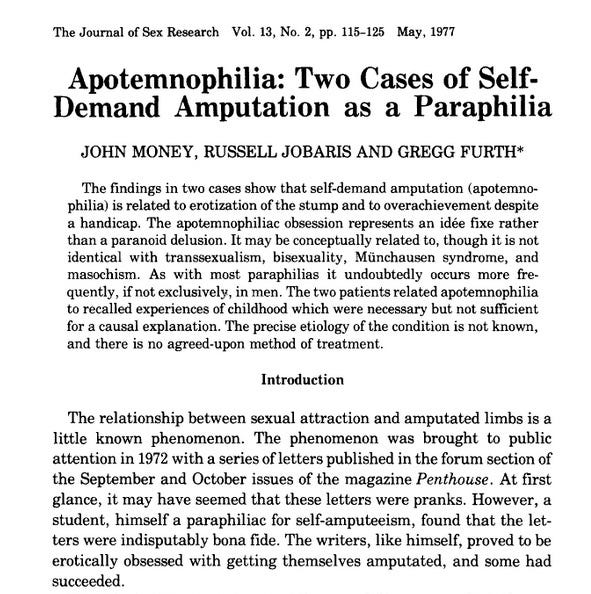The Dance of the Invisible Gorilla
When I returned to the story of wannabe amputees this week I realised I had missed important details that had been staring me in the face. It turns out this story is even darker than I had imagined.
Why do we notice some things and not others? I’ve been talking a lot about wannabe amputees recently. If I ever compete on Mastermind it can be my specialist subject. As I was preparing to do a webinar on the subject I suddenly realised I’d missed elements of this story that give it an even more troubling slant.
Our controversial mate Freud from yesterday’s post claimed we deliberately ignore things. Nothing is an accident. But the only thing I’ve been deliberately ignoring lately is him. Freud’s treatment of many of his patients was sickening. Literally. I didn’t unpack that in my last post because it would have made it much longer and that would have distracted from the point I was trying to make.
That’s one legitimate reason we all end up ignoring things. Once we have enough evidence to mount an argument do we really need to keep mining every possible seam?
Then there are the things we see in the corner of our eye but are too busy looking for something else. In those cases we can easily miss a red flag fluttering. It was this that happened with the wannabe amputee story. You probably know the famous experiment conducted by the psychologist Daniel Simons? It’s a test of attention that involves asking viewers of the video below to count the number of volleyball players wearing white shirts.
If you don’t know this experiment I urge you not to read on before watching the video first. The answer is at the end of this article.*
When I first watched the video I had never heard of the experiment and was astonished by what it revealed.
The video proves how unreliable our attentiveness can be. Once we focus on one thing we can miss something else huge we weren’t looking for. Here’s a case in point.
If you follow me on Twitter/X you’ll probably know that two decades ago I worked on a BBC documentary about people who suffer, if that’s the right word, from apotemnophilia or ‘amputation love’. In the Horizon, leading experts on transsexuality used the fact we allow doctors to cut off healthy parts of transsexuals’ bodies to justify cutting limbs off the bodies of people who believe they were always meant to be amputees. I was always meant to be rich by the way. Fat load of good that’s done me.
The only logical response to the claim that transsexuality validates chopping legs off is a version of the Irishman’s reply in the old joke. When a tourist asks him the directions to Dublin, he says, “Well sir, if I were you, I wouldn’t start from here.”
Talking of the Irish, it was the legend that is Stella O’Malley who invited me to discuss the history of gender identity ideology last month with her and the equally empathetic Sasha Ayad.
Our discussion was wide-ranging and apotemnophilia was only a small chapter. You can watch the show here if you’re so inclined. I won’t judge you if you don’t. One of the disadvantages of being involved in this battle is there is now so much good content being produced you need to have a whole new gender identity just to keep up with it.
What I noticed was that when the conversation turned to the wannabe amputees, people who feel they are burdened by having too many limbs, my memory was a little rusty. So when Stella, who is clearly a glutton for punishment, asked me to join another webinar from the GenSpect folks this week specifically on apotemnophilia I thought I’d better gen up.
You can watch the results of all my genning up here. Why they put young attractive and smart Mia Hughes on the video thumbprint and not a bald old fucker like me is a complete mystery and probably something to do with the patriarchy. Or something.
This time round I was determined to have no rusty moments and so did a quick dip into the original sources. It was only then that a big dancing gorilla loomed into view. If you haven’t watched the video of those volleyball players this reference will probably make no sense. You can’t say I didn’t warn you.
I’ve written at length elsewhere on this site about the trip I made to Germany to film Hans Schaub, a man who wanted his leg chopped off. A Scottish surgeon by the name of Robert Smith agreed to do it.
Hans was perfectly happy with the outcome which he described as the best decision of his life. It’s this question, of whether customer satisfaction should really govern medical ethics, with which the webinar spends a lot of time grappling.
Most of us are tempted to think ….if it makes adults happy to have an operation, then let them. But what if the people demanding surgery are mentally ill? And what if validating their desires leads to a social contagion, as it did with ‘gender affirmation healthcare’ or sex lobotomies for children, as someone has brilliantly rebranded it?
The biggest problem, though not the only one, with validating adult transgender delusions was that these didn’t stay in the adult world. They gravitated south to infect children. Cue….girls lining up to have their breasts removed and all sorts of gender non-conforming kids being medically re-conformed by the power of hormones and surgery. The concern must be that the same sort of dynamic might play out should our society ever validate apotemnophilia. Might troubled children begin to adopt the amputee narrative as an explanatory answer to their problems?
Once I had refreshed myself with all the dates, locations and characters that mattered, in the BBC story I let myself drift through the internet and it was then that those things that had been hiding in plain sight waved their red flags cheerily. I had not noticed before that the surgeon, Robert Smith, did not just return quietly to everyday surgery after being rebuked by his NHS Trust.
Instead this clinician, whom the BBC had presented as entirely objective and disinterested, went on to openly campaign for the rights of apotemnophiles, writing papers and delivering lectures.
When his NHS Trust refused to allow him to conduct a third amputation (he’d managed to do two, one of them Hans from Germany, before the tabloids got hold of the story and triggered a retreat) Smith tried to convince private hospitals to let him do the third operation on their premises.
They refused.
I hadn’t realised until now just how invested Smith was. It was almost as if he was part of this strange fetish cult. I must emphasise this is a notion which is entirely unsupported by any evidence. I’d hate to unwittingly malign this absolute disgrace to medical ethics.
This discovery was trivial compared to what came next.
The third man who had hoped to get his leg removed by Smith was the American, Gregg Furth. I already knew Furth was a distinctly strange man. It was his letters about his own sexual amputee fetish in Penthouse magazine which brought the condition to the attention of the infamous sexologist John Money. Furth even became a collaborator with Money on the 1977 paper that first introduced the term apotemnophilia.
Money loved nothing more than coining words. Apart from forcing children to mimic sex positions while naked in the guise of medical research. That was probably his favourite pursuit of all.
In the BBC Horizon, Furth laments that he could not get his leg chopped off. I was a minor part of the team that was roped in to make the show and I have long been baffled by the producers’ respectful treatment of Furth. Furth, was essentially a spokesperson for the nascent apotemnophile lobby and conspired with the other interviewees to present their psychiatric condition as unrelated to sexual fetishism. This was a deception. What the producers kept from the audience was bad enough. What I discovered for myself this week was positively jaw-dropping.





